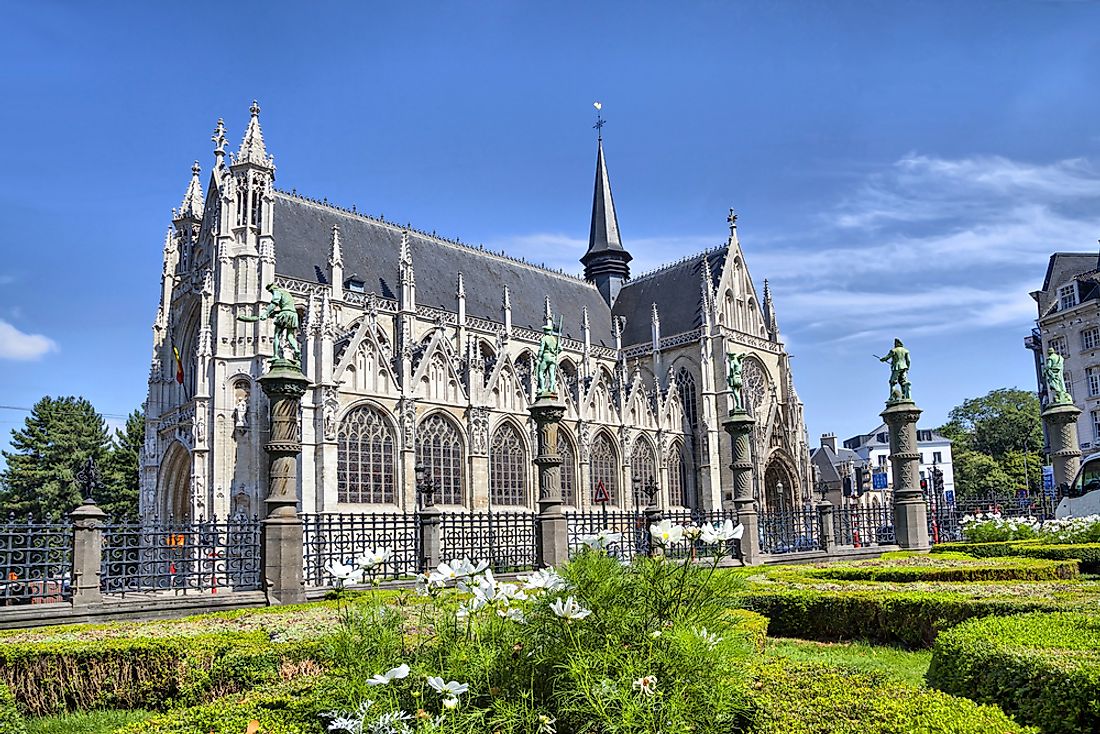Major Religions in Belgium

The constitution of Belgium was written to include freedom of religion for Belgian residents. In reality, government officials reserve the right to investigate any religion that is not formally recognized within the country. Recognized religions include Catholicism, Protestantism, Judaism, Islam, Anglicanism, and Greek and Russian Orthodox.
The government provides these groups with a portion of the state’s monies. Different levels of government pay for different areas of religious needs, depending on the activity. Salaries for ministers and teachers, construction projects, maintenance, and public broadcasting are all paid by different levels of the government. Students must study religious subjects in public school, and this is taught based on students’ personal religious affiliation. Public religion teachers are hired by schools for each of the recognized religions.
According to the United States Department of State’s International Religious Freedom Report of 2007, Belgium has various cases of religious discrimination as well as anti-Semitic and anti-Islamic activity. An unrecognized religion, like Buddhism, is not prohibited from practice, it just does not receive government monies. The organization may, however, receive nonprofit, tax-free status.
Residents of Belgium identify with several different religions. This article takes a look at the religious composition of the country.
Roman Catholics
Over half the population, 58%, identifies as Roman Catholic although regular church attendance has dropped by more than half since the late 90’s. Today, around 6% of Catholics attend church regularly. The number of ordained priests is also decreasing and in 2007, only 2 entered the practice. Under Spanish rule, Catholicism was the only permitted religion in the area. Other religious practices were punishable by death, this regulation began in 1592 and lasted until religious freedom was established in 1781. The Catholic Church enjoyed significant political power until the middle of the 20th century, influencing the requirement for religious education in public schools. The Catholic king tried to stop Parliament from legalizing abortion in 1990 but was overruled by government officials.
Atheist Or Agnostic
The next largest religious affiliation is the 27% of the population who identify as either atheist or agnostic. This percentage makes Belgium one of the least religious countries in the world, on par with other Western European nations. Although the country no longer conducts a religious census, as church attendance declines and more people move into the urban zones, this percentage is expected to climb. Atheism and Agnosticism are positively correlated to urban living and higher levels of education.
Non-Catholic Christians
Non-Catholic Christian religions include Orthodox, Protestant, and Restoration practitioners. They make up about 7% of the total population. The majority of these individuals are Protestants which includes Methodists, Lutherans, Baptists, and Presbyterians.The Protestant Reformation of the 1500’s helped to spread the practice of this religion and at one point, Protestants made up nearly 20% of the population. This situation changed however, under King Philip II of Spain and his Catholic Reformation period which persecuted non-Catholics and caused many of them to flee the country. The Protestant religion was not recognized until the beginning of the 1800’s.
Muslims
The religion of Islam has been increasing within the country and today, 5% of the population identifies as Muslim. The growth of this religion began in the 1960’s when Morocco, Turkey, Algeria, and Tunisia signed immigration agreements with Belgium. Muslims began entering the country on work visas, and Belgium offered a liberal family unity program that helped the Muslim population grow significantly. Approximately 35% of Muslims from Turkey and Morocco are under 18 years old which means when these individuals grow older and begin to have their families, the percentage of Muslims in Belgium will grow. Brussels, the capital, has the largest concentration of Muslim practitioners where they make up 20% of the population.
Other Beliefs
Other religious beliefs in Belgium are practiced by 3% of the population. Some of these religions include Buddhism, Judaism, Hinduism, Sikhism, and Jainism. As immigration to this country increases, these religions are also expected to grow in followers. This growth may someday lead to these religions becoming recognized by the government and eligible for subsidies.
Religion In Contemporary Belgian Society
| Rank | Belief System | Share of Belgian Population Today |
|---|---|---|
| 1 | Roman Catholic Christian | 58% |
| 2 | Atheist or Agnostic | 27% |
| 3 | Non-Catholic Christian | 7% |
| 4 | Muslim | 5% |
| 5 | Other Beliefs | 3% |







